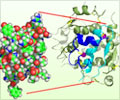Researchers at the Salk Institute for Biological Studies have discovered a novel mechanism that turns up glucose production in the liver when blood sugar levels drop - a discovery

"In liver cells, so-called class II HDACs are usually sequestered outside the nucleus but in response to fasting signals they quickly shuttle into the nucleus where they help turn on genes needed for glucose production," said Reuben J. Shaw, an assistant professor in the Molecular and Cell Biology Laboratory.
"Thus drugs that specifically inhibit HDACs involved in gluconeogenesis may be very useful for the treatment of diabetes and metabolic syndrome," he said.
A few years ago, Shaw had discovered how metformin, the most widely used drug to control blood glucose levels in type II diabetics, helps insulin to control glucose levels. It binds to a "metabolic master switch" known as AMPK that blocks glucose production in the liver.
Trying to identify novel targets of AMPK that might be relevant to diabetes Maria Mihaylova, a graduate student in the Shaw laboratory, focused her efforts on a family of HDACs known as class II HDACs.
"We identified class II HDACs as direct targets of AMPK in a bioinformatics-based screen, but we didn't know which genes they might regulate in liver since they weren't even known to be found there," said Mihaylova.
Advertisement
The finding was published in the May 13, 2011, issue of the journal Cell.
Advertisement















